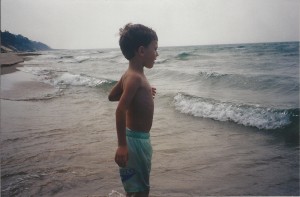My daughter Natalie was on spring break a few weeks ago from her grad program at Northwestern, and my husband and I took her out to dinner to celebrate another semester of perfect grades.
Instead of dessert at the restaurant, she chose ice cream at our old stand-by, Baskin Robbins. Our visit would not have been complete without rehashing the episode of mortification which occurred on that very spot, circa 1999, so of course I obliged by reenacting the entire incident once more.
It’s a wonder I ever set foot in that place again. But what at the time seemed like the most excruciating event imaginable has become one of our family’s favorite and most repeated stories. It turns out everything really is relative, after all.
Before Daniel came along, I thought I was holding my own pretty well in the parental discipline department. Granted, with Natalie it was easy; she was a dream child, rarely causing scenes even within the privacy of our home, much less in view of a public audience.
It became a little more difficult with Daniel. As he grew from toddler to child, he found ways to express himself often at odds with convention. His inability to communicate through functional language, despite years of speech therapy, has long been a stumbling block in his progress. We recognize most of his basic “words”, but he is often frustrated by our failure to understand specifically his wants and needs. He’s learned that sometimes he just has to take what he wants.
Which brings us to Baskin Robbins on a dreary day off from school, with no structure or routine to deflect the crankiness of a child teetering on a really bad mood.
Natalie was playing with our neighbors’ girls across the street, and Daniel and I were struggling through a restless mid-afternoon. Unable to keep his attention on any activity for more than a few minutes, I had an inspiration. Abandoning my principle that a trip for ice cream should constitute a treat, I grabbed my back-arching and crabby son by the hand and we walked the few blocks to the ice cream parlor.
Despite the 31 flavors available to him, Daniel always chooses vanilla. Mollified, he sat still and worked methodically through his cone, after first chewing off the safety cup’s crunchy bottom, creating a dripping mess I wiped at in vain with a pile of napkins.
“Finished?” I asked brightly, when the last crumb had been consumed.
“Cone,” he replied, pointing to the glass case housing the vanilla bucket.
“Daniel, you just had a cone,” I said, wadding the napkins in my sticky fist.
“Cone,” he repeated. “Cone!”
“No, Daniel,” I said sternly. “Just one cone.” I stood and moved toward the wastebasket at the far end of the store.
Stuffing the napkins in the garbage, I turned to see Daniel bolting from his chair and darting past the glass case. I knew where this was going before comprehension had fully hit my brain.
“Daniel! Daniel! Daniel!” I cried, as he raced behind the counter, honing in on the vanilla like a heat-seeking missile.
“Daniel! Stop! Daniel! Stop!” I repeated desperately, running to catch up.
I had almost reached him when in one deft motion, his threw up the glass door, plunged his grimy hand into the vat of ice cream and shoved a handful into his mouth, swallowing with a defiant glare of triumph.
“Let me die now,” I thought, as the lone teenaged clerk turned from the appalled customer she was serving and found us in her workspace.
“I’m so sorry,” I began lamely, “but my son reached into the case here… ”
The clerk appraised me, sticky and frantic, and glanced down at my unrepentant son. “No problem,” she murmured. “It’s fine.”
“Well, he stuck his hand in the vanilla,” I continued wretchedly. “I’m so sorry. I’ll pay for it.”
Perhaps calculating the effort involved in fetching a new, five-gallon tub of vanilla from the storage freezer, the clerk shook her head. “Don’t worry about it.” She made a little waving motion with her hand. “Really. No problem.”
“Well… ok,” I mumbled. “Thank you so much. I’m so sorry.”
Seizing Daniel by the arm, I hurried out the back door, avoiding the dumbfounded gaze of our fellow customer.
“How could you do that, Daniel?” I hissed as we stumbled down the sidewalk toward home. “Do you have any idea how embarrassing that was? We’re going to have to leave town! You’re never getting ice cream again in your whole life!”
I paused to take a breath, and he stole a glance at me, his face open and benign.
“Cone?” he asked. He offered a tentative smile. “Cone.”
Oh, Daniel. I miss you.
I miss you.



